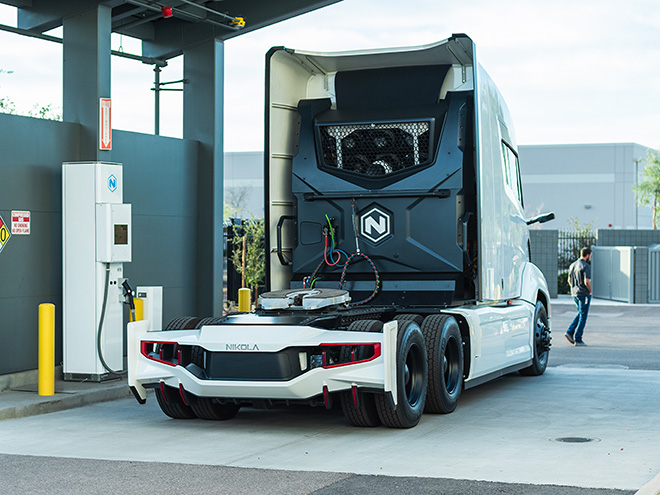In these troubled days, the world is divided into two hostile camps—each faction demonizes the other, and refuses even to listen to the other side’s arguments. Families have been torn apart, and sometimes it seems people are about to come to physical violence, or even block former Facebook friends.
But what if the batteries-vs-hydrogen debate is based on a false choice? What if both technologies have important niches to fill in the zero-emissions ecosystem? Nikola founder Trevor Milton had plenty to say on this topic in a lengthy interview on This Week In Startups.
Host Jason asked what must seem an obvious question: Why focus on hydrogen instead of batteries? Tesla, which famously wants nothing to do with hydrogen, is the stock market darling of the year (Jason’s a Tesla owner and obviously a fan), and the legacy automakers have been abandoning hydrogen one by one. Is Nikola swimming against the tide?
This may be a case of asking the wrong question. Trevor Milton clarifies that Nikola plans to produce both battery-electric and fuel cell vehicles. “There are two different markets,” says he. “A lot of people think hydrogen competes with batteries—it doesn’t. [A battery powertrain] works really good up to about 300 miles. Over 300 miles hydrogen makes much more sense, because of weight. The weight is everything in trucking.” As Milton explains, more battery weight means less payload, and thus less revenue.
Milton acknowledges that “hydrogen does not make sense in every situation—it’s only a very narrow window.” Inside that narrow window is long-haul trucking, which is a trillion-dollar industry.
Nikola’s business model is not built around selling trucks—rather, it involves selling transportation on a pay-per-mile basis. The idea is to provide a package of vehicles and infrastructure that’s tailored to serve particular trucking routes. Nikola will provide the trucks, the fueling stations (which will be optimally sited for each particular customer’s needs) and the hydrogen, and the customer will pay “about a dollar a mile.”

Milton understands as well as anyone that hydrogen doesn’t make sense for passenger cars: “Cars are a terrible idea a lot of times with hydrogen,” he says, adding that automakers that have been trying to sell fuel cell cars “went after the wrong market.” It’s a question of the right storage medium for the right type of vehicle. “In cars, batteries are awesome…when you get into cars and light-duty [vehicles], batteries are the best thing. Heavy-duty—hydrogen’s the best thing.”
Milton covered a lot more ground in this interview: why trucking companies are phasing out diesel, the challenge of competing against Tesla, the pros and cons of building components in-house vs outsourcing, and Nikola’s future plans for consumer pickup trucks.
There’s plenty of material worth watching here, but for us, Milton’s explanation of the respective strengths of batteries and fuel cells is a highly timely highlight. Those who are hoping to see a battery-vs-hydrogen smackdown (In this corner, the debunker of fool cells, Elon Musk!) may be disappointed, but, in the EV realm, peaceful coexistence probably makes a lot more sense.
Source: This Week In Startups
Source: Electric Vehicles Magazine


